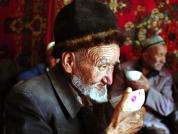
The Artists of the Chaikhana
The following artists will bring the artistry and the community of a traditional teahouse (chaikhana) to life on Wednesday, June 9th at the Asia Society.
Qania 'Ada'
Ada was born in the city of Gujrat in Pakistan and received her M.A. degree from Gujrat University. She was active in literary activities in her school and college, while serving as president of the Students Union of her college. She adopted 'Ada' as her pseudonym when she began writing poetry. Qania 'Ada' won several prizes at the Inter-collegiate mushairas (traditional poetry symposiums). She taught Urdu literature at the college in her home town and continued her interest in Urdu poetry after she moved to New York with her family. Ada published her collection of poems titled Ansoo (Tears) that features her famous poem of the same name. Ada presents her poems at literary gatherings in New York and is active in literary activities as well.
Abdoulaye Diabate
Diabate was born in Kela, Mali. Raised in the heart of the Mande tradition from a long line of musicians, Abdoulaye has spent some thirty years performing contemporary and popular music. His musical career led him to a fusion of diverse styles. In 1973 Diabate joined the Tenetemba Jazz group in Bamako, Mali. He later became known as the lead singer of the Koule Star Band of Kouchala.
In 1975 Diabate moved to Abidjan, Ivory Coast, where he formed his own twelve piece band, Super Mande. Some of the greatest luminaries of West African music have taken part in this group, including Salif Keita, Mory Kante, Kante Manfila, Ousmane Kouyate and many more. In 1992, Diabate joined the world renowned Ballets Koteba as a singer and guitarist. In the mid-nineties, he toured the world with Les Go de Koteba and came to settle in New York City. Abdoulaye was noted in 2002 as the star of the Smithsonian Folkways compilation, Badenya, Manden Jaliya in New York City. Since then, Abdoulaye has made further inroads in the world music scene with collaborations with jazzmen Don Byron, Peter Appelbaum and guitarist Banning Eyre. His latest solo recording is entitled Sara.
Sabiha Khatoon
Sabiha Khatoon was educated at Karachi University in Pakistan, where she later taught in the department of biochemistry and went on to receive her Ph.D. in biochemistry from the University of Wyoming. Khatoon has been doing research on Alzheimer’s disease at the New York State Institute for Basic Research. Sabiha Khatoon is an active member of the Association of Pakistani Scientists and Engineers and has received awards for her scientific work.
When not working in the sciences Khatoon writes poetry, exhibiting a classical style that is also noted for its innovative, modern spirit. Khatoon is the president of the Ghalib Study Circle of New York. She has participated in mushairas (traditional poetry symposiums) in North America, Europe, India and Pakistan. Her poetry has been published widely and widely recognized with several awards.
Asad ur Rahman
Asad ur Rahman received his B.A. (Honors) degree in English from St. Stephen’s College, Delhi University, and advanced degrees from Aligarh Muslim University in India and Cambridge University. While at London University, Rahman focused his research on late Victorian poetry. He is interested in what is generally called the courtly love tradition, and he has presented papers at international conferences on the subject.
Rahman also retains a deep interest in Urdu poetry and was one of the first people to hold mushairas (traditional poetry symposiums) in his New York home, dating from 1972. From 1951 to 1968, Rahman taught English literature at Aligarh Muslim University. He later joined the faculty of English at Brooklyn College of the City University of New York (CUNY) from which he retired in 1996. He has most recently edited and published a book written by his father entitled Noor ur Rahman, the Life and Teachings of a Sufi Saint of India.
Raees Warsi
Raees Warsi was born in Karachi, Pakistan. He is a graduate of Karachi University with a degree in science and went on to earn an M.A. in mass communication. Warsi started writing articles for newspapers and magazines in his student days, while also exploring Urdu poetry. Soon he was a well-established poet and a regular feature at the mushairas (traditional poetry symposiums) in his city. He is the founder of the Urdu Markaz (Urdu Center) in New York in 1989. Warsi participated in the International Urdu Conference at the United Nations in 2000 and is active in literary, journalistic and cultural activities in New York.

